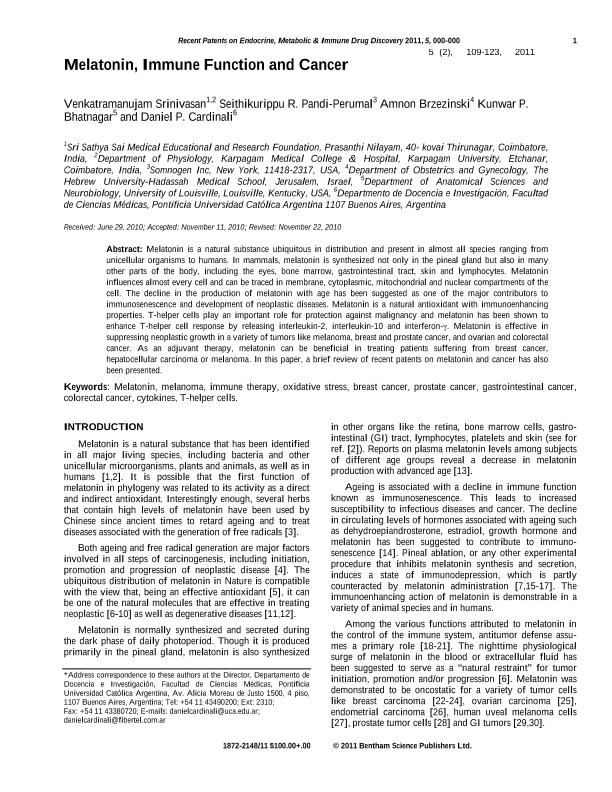Mostrar el registro sencillo del ítem
dc.contributor.author
Srinivasan, Venkatramanujam
dc.contributor.author
Pandi Perumal, Seithikurippu R.

dc.contributor.author
Brzezinsk, Amnon
dc.contributor.author
Bhatnagar, Kunwar P.
dc.contributor.author
Cardinali, Daniel Pedro

dc.date.available
2023-04-14T15:43:38Z
dc.date.issued
2011-11
dc.identifier.citation
Srinivasan, Venkatramanujam; Pandi Perumal, Seithikurippu R.; Brzezinsk, Amnon; Bhatnagar, Kunwar P.; Cardinali, Daniel Pedro; Melatonin, immune function and cancer; Bentham Science Publishers; Recent Patents on Endocrine, Metabolic & Immune Drug Discovery; 5; 2; 11-2011; 109-123
dc.identifier.issn
1872-2148
dc.identifier.uri
http://hdl.handle.net/11336/193896
dc.description.abstract
Melatonin is a natural substance ubiquitous in distribution and present in almost all species ranging from unicellular organisms to humans. In mammals, melatonin is synthesized not only in the pineal gland but also in many other parts of the body, including the eyes, bone marrow, gastrointestinal tract, skin and lymphocytes. Melatonin influences almost every cell and can be traced in membrane, cytoplasmic, mitochondrial and nuclear compartments of the cell. The decline in the production of melatonin with age has been suggested as one of the major contributors to immunosenescence and development of neoplastic diseases. Melatonin is a natural antioxidant with immunoenhancing properties. T-helper cells play an important role for protection against malignancy and melatonin has been shown to enhance T-helper cell response by releasing interleukin-2, interleukin-10 and interferon-��. Melatonin is effective in suppressing neoplastic growth in a variety of tumors like melanoma, breast and prostate cancer, and ovarian and colorectal cancer. As an adjuvant therapy, melatonin can be beneficial in treating patients suffering from breast cancer, hepatocellular carcinoma or melanoma. In this paper, a brief review of recent patents on melatonin and cancer has also been presented.
dc.format
application/pdf
dc.language.iso
eng
dc.publisher
Bentham Science Publishers

dc.rights
info:eu-repo/semantics/openAccess
dc.rights.uri
https://creativecommons.org/licenses/by-nc-sa/2.5/ar/
dc.subject
BREAST CANCER
dc.subject
COLORECTAL CANCER
dc.subject
CYTOKINES
dc.subject
GASTROINTESTINAL CANCER
dc.subject
IMMUNE THERAPY
dc.subject
MELANOMA
dc.subject
MELATONIN
dc.subject
OXIDATIVE STRESS
dc.subject
PROSTATE CANCER
dc.subject
T-HELPER CELLS
dc.subject.classification
Fisiología

dc.subject.classification
Medicina Básica

dc.subject.classification
CIENCIAS MÉDICAS Y DE LA SALUD

dc.title
Melatonin, immune function and cancer
dc.type
info:eu-repo/semantics/article
dc.type
info:ar-repo/semantics/artículo
dc.type
info:eu-repo/semantics/publishedVersion
dc.date.updated
2023-04-13T14:34:06Z
dc.journal.volume
5
dc.journal.number
2
dc.journal.pagination
109-123
dc.journal.pais
Estados Unidos

dc.description.fil
Fil: Srinivasan, Venkatramanujam. Karpagam Academy Of Higher Education; India. Sri Sathya Sai Medical Educational And Research Foundation; India
dc.description.fil
Fil: Pandi Perumal, Seithikurippu R.. No especifíca;
dc.description.fil
Fil: Brzezinsk, Amnon. The Hebrew University of Jerusalem; Israel
dc.description.fil
Fil: Bhatnagar, Kunwar P.. University of Louisville; Estados Unidos
dc.description.fil
Fil: Cardinali, Daniel Pedro. Pontificia Universidad Católica Argentina "Santa María de los Buenos Aires"; Argentina. Consejo Nacional de Investigaciones Científicas y Técnicas; Argentina
dc.journal.title
Recent Patents on Endocrine, Metabolic & Immune Drug Discovery
dc.relation.alternativeid
info:eu-repo/semantics/altIdentifier/url/https://benthamscience.com/article/39396#:~:text=Melatonin%20is%20effective%20in%20suppressing,cancer%2C%20hepatocellular%20carcinoma%20or%20melanoma.
dc.relation.alternativeid
info:eu-repo/semantics/altIdentifier/doi/http://dx.doi.org/10.2174/187221411799015408
Archivos asociados
